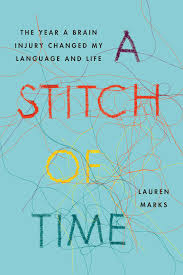Synopsis (From Goodreads):
Lauren Marks was twenty-seven, touring a show in Scotland with her friends, when an aneurysm ruptured in her brain and left her fighting for her life. She woke up in a hospital soon after with serious deficiencies to her reading, speaking, and writing abilities, and an unfamiliar diagnosis: aphasia. This would be shocking news for anyone, but Lauren was a voracious reader, an actress, director, and dramaturg, and at the time of the event, pursuing her PhD. At any other period of her life, this diagnosis would have been a devastating blow. But she woke up...different. The way she perceived her environment and herself had profoundly changed, her entire identity seemed crafted around a language she could no longer access. She returned to her childhood home to recover, grappling with a muted inner monologue and fractured sense of self.
Soon after, Lauren began a journal, to chronicle her year following the rupture. A Stitch of Time is the remarkable result, an Oliver Sacks–like case study of a brain slowly piecing itself back together, featuring clinical research about aphasia and linguistics, interwoven with Lauren’s personal narrative and actual journal entries that marked her progress. Alternating between fascination and frustration, she relearns and re-experiences many of the things we take for granted—reading a book, understanding idioms, even sharing a “first kiss”—and begins to reconcile “The Girl I Used to Be” with “The Girl I Am Now.” Deeply personal and powerful, A Stitch of Time is an unforgettable journey of self-discovery, resilience, and hope.
Review:
When I was twenty-seven, my dad had a massive stroke, brought on by uncontrolled diabetes. Suddenly, he was a different person. He went from an outgoing, larger than life personality, to a quiet man who couldn't carry on a conversation. I have often wondered what he was thinking about during that time. Was he trapped in a body that couldn't respond, or was he truly a different person?
A Stitch Of Time, by Lauren Marks, is a fascinating first person account of a woman who survives a traumatic brain injury. As she is singing karaoke in a bar, she suffers from a massive brain aneurysm and her life is changed forever. This book covers a year in her recovery, and whether language creates thought or thought begets language.
What I Liked:
First-Hand Account:I really appreciated the author's insight into what she was thinking during those first months of recovery. She recalls that there was very little panic or despair, at first. Just "The Quiet".
I also was absorbed by how Lauren was treated by her friends, family, and lover. Many of these people assumed that once she regained the use of language, she would be the same person. But much of what made Lauren's personality was altered. She had to assess what kind of person she had been and see how that meshed with who she was after this life-altering event.
Medical Jargon Explained:
The author went to great lengths to make sure the reader understood how the brain functions and what an aneurysm actually is. She also delved into how language is accessed by people diagnosed with aphasia, and how speech therapists worked with her to regain her use of language. This was confusing, at the beginning of the book. However, I think we are meant to be as bombarded with terms and ideas as Lauren was. It is only as she progresses that things make sense for both the narrator and the reader.
What I Was Mixed About:
Relationship With Her Lover:I suppose that the author felt that chronicling her relationship with her on-again, off-again lover would be a good lynch-pin for the book. But I found much of it tedious, and indulgent. I didn't really want to know every detail of this courtship, and wonder how this other person must feel about the publication of this book.
What Didn't Like:
The author was an actress and teacher prior to having her aneurysm. She seems to credit her extensive literary background with part of her recovery. While she does show both arguments for and against the idea of language creating thought or thought creating language, I found some of her ideas to be elitist. Do people really need a master's degree to be great communicators and thinkers? She implies that her thoughts are certainly deeper due to her extensive education. Really? As someone who works with students, some of whom have difficulty accessing language, I was very put off by this.Rating:
Release Date: May 2nd, 2017
Genre: Non-Fiction
Source: NetGalley
Format: ARC E-book
Recommendation: I think this book would be most interesting to readers who know someone dealing with brain injuries. While it is worth your time, be prepared for a little TMI (too much information) about the author's love life.






































0 comments :
Post a Comment